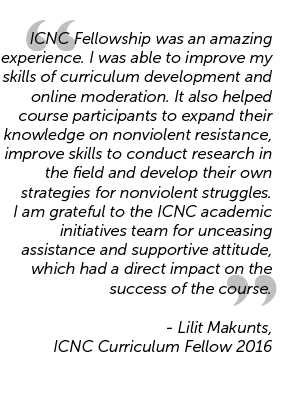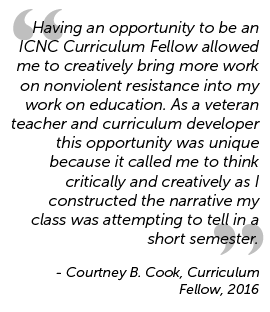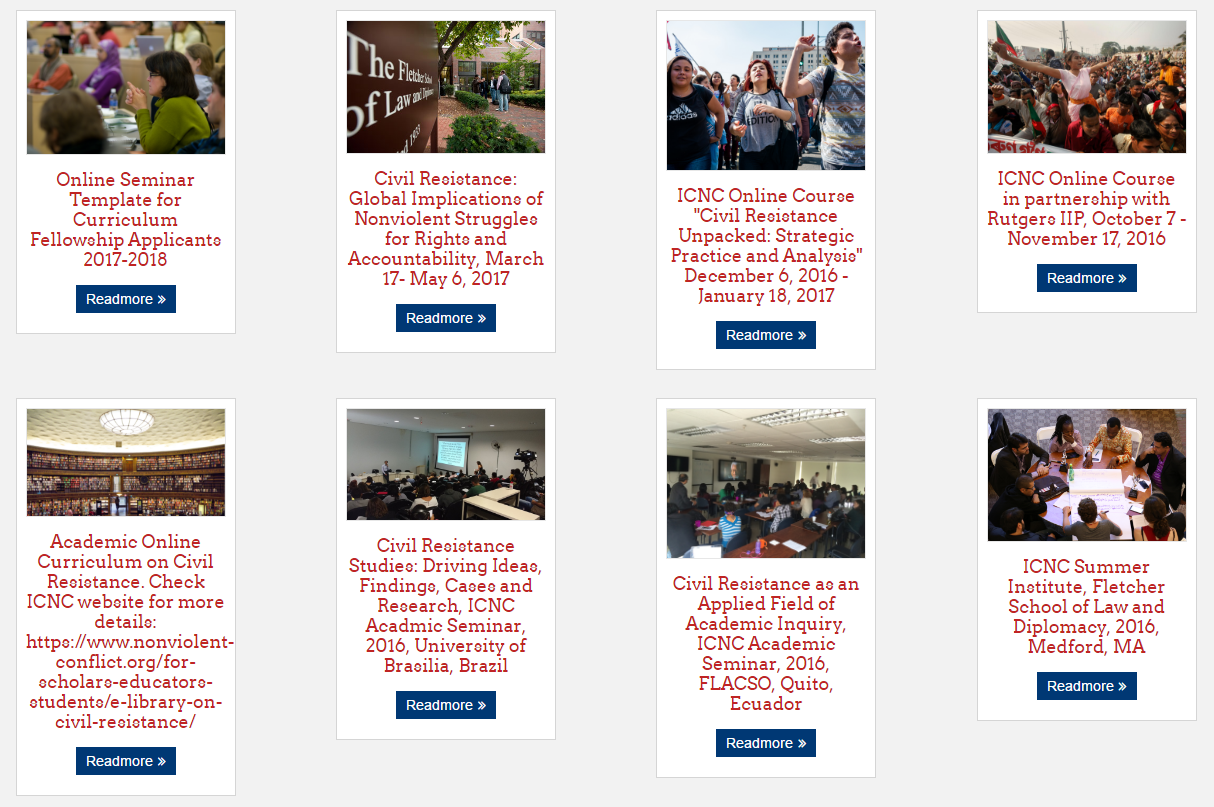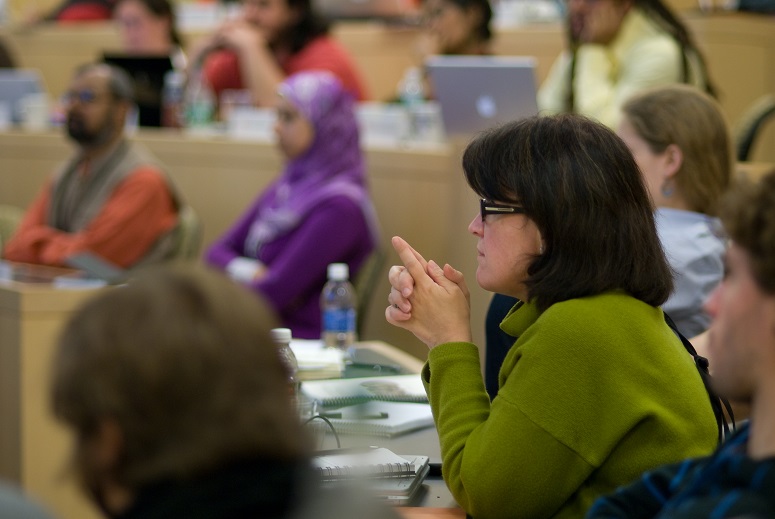for
Classroom-Based and Online Teaching Proposals on Civil Resistance
ICNC is launching the fourth edition of its Curriculum Fellowship program to support and advance classroom-based and online teaching of civil resistance in Summer, Fall 2017, Winter or Spring 2018.
On this page, you will find the following information about the fellowship:
Eligibility
Previous Fellowship Awardees
Information about the Award
Requirements for Classroom-based Course Application
Requirements for Online Seminar Application
Links to Online Applications
Resources for Curriculum Proposal Development
Fellowship package
We acknowledge the benefits of traditional classroom-based teaching and online learning. Therefore, for the second time, we are offering Curriculum Fellowships to support both formats. We strongly encourage applications from academic faculty and educators from countries or regions with restrictive spaces or conflict-torn places where greater knowledge and understanding of nonviolent resistance practices would benefit young people and society in general.
The deadline to apply is April 30, 2017. See below for more information on how to apply.
View the 2016 Fellowship Awardees
View the 2015 Fellowship Awardees
View the 2014 Fellowship Awardees
Eligibility
- Scholars, and instructors from colleges and universities around the world who are interested in expanding their institutions’ existing curriculum to cover civil resistance.
- Educators and trainers who might be loosely affiliated with academic institutions at home or abroad but have academic-based training or pedagogical and teaching experience, particularly in regions and countries with restrictive civic spaces or conflicts.
ICNC is interested in promoting teaching of civil resistance in academic institutions that have not yet developed coursework on the subject. We especially encourage applications from candidates who do not currently teach civil resistance at the institutions where they want to develop the new curriculum unit. We also prefer that the institutions have at present no courses on civil resistance offered as part of the departmental, school, or university curriculum.
In addition, ICNC is strongly interested in supporting the expansion of online teaching on civil resistance, particularly in situations where it is difficult or impossible to develop a formal classroom-based course at a local academic institution. In such cases, ICNC Curriculum Fellowships aims to encourage and support interested instructors to set up an online seminar on civil resistance and offer it to a select group of interested learners.
Applicants would ideally demonstrate that the proposed new curriculum unit or online seminar on civil resistance is not a one-time initiative, but rather that the applicant has a vision for a continued teaching in this field and demonstrates an effort to turn the ICNC Curriculum Fellowship into a sustainable teaching offering (e.g. at least once a year) even though ICNC curriculum support for the course or online seminar will not continue.
Award Details
In 2017, up to seven curriculum fellowships, each in the amount of $1,300, will be offered on open, merit and competitive bases to qualified applicants to develop:
 1. a curriculum unit on civil resistance that will be incorporated into the existing classroom-based, elective or mandatory, semester-long course at the applicant’s home university. For more see Classroom-Based Course
1. a curriculum unit on civil resistance that will be incorporated into the existing classroom-based, elective or mandatory, semester-long course at the applicant’s home university. For more see Classroom-Based Course
OR
2. an online seminar on civil resistance that will be offered to students and interested participants from applicant’s university, town, district, country or the region. The online seminar would be given through the designated ICNC’s online platform. For more see Online Seminar
Teaching for 2017/2018 ICNC Curriculum Fellowships is expected to take place either in Summer, Fall 2017 or Winter, Spring 2018.
The application deadline is April 30, 2017.
1. Applicants interested in developing and teaching classroom-based courses back
A curriculum unit on civil resistance, at minimum, covers five 90-minute sessions over the course of minimum of 5 weeks as part of the undergraduate or graduate course and consists of either instructor guides, readings, modules, exercises, or simulations directly relevant to the field of civil resistance.
As part of the fellowship it is expected that:
a. fellow develops a full-fledged course syllabus that includes a curriculum unit on civil resistance
b. sessions on civil resistance that are part of the developed curriculum unit will, at minimum, analyze and explain to students:
- what civil resistance is, prevailing misconceptions
- historical record and effectiveness of civil resistance
- strategies and tactics of civil resistance
- dynamics of civil resistance including but not limited to the phenomenon of backfire, defections, movement mobilization, sustainability or tactical innovation and sequencing
c. no less than 10 students will register and attend the course
d. course syllabus, assignments and assessment materials are to be developed in English, though the course itself can be conducted in a different language
e. fellow hosts at least one guest speaker that will present on a selected topic on civil resistance
f. fellow develops online evaluation instrument to be used to assess progress in students’ learning about civil resistance
Review:
- template of a pre-seminar learning gains survey (distributed prior to the start of the seminar)
- template of a post-seminar learning gains survey (distributed at the end of the seminar)
g. fellow develops online final course evaluation to solicit students’ feedback on the course content on civil resistance
Review:
- template of the final course evaluation
h. fellow submits a final report to ICNC soon after the course or curriculum unit ends. The report will summarize content on civil resistance delivered, including any innovative teaching tools used, information on the guest speaker talk, aggregate results from the students’ learning gains surveys, results from the final evaluation and general lessons learnt
i. students’ feedback/evaluation and recommendation for improvements
j. fellow selects and submits to ICNC- with students permission –one/two outstanding pieces of written or audio/video work on civil resistance done as part of the course
To be considered applicants should review ICNC recommended list of resources, fill out the online application form, submit CV and curriculum proposal, and other information as requested.
APPLY for the Classroom-Based Fellowship
The curriculum proposal should include a detailed description of the content of at least five 90-minute sessions with the assigned relevant literature that will become an integral part of the existing course. If applicable, the applicant should also attach a revised syllabus that will include the newly proposed sessions on civil resistance and explain how these new topics relate to the existing course material. Finally, the application will identify the course number, its elective or mandatory status, departmental/institutional affiliation for the course, average number of enrolled students, and the semester when it will be offered.
Application Deadline
The deadline for proposal submissions is April 30, 2017 for classroom-based courses offered in summer and fall 2017 or winter/spring 2018.
2. Applicants interested in developing and teaching online seminars back
Online seminar consists of a minimum of 5 weekly sessions on civil resistance where participants are asked to review relevant session notes, videos, and readings and then engage in forum discussions moderated by a seminar instructor.
As part of the fellowship it is expected that:
a. Perspective applicant will access and review the Curriculum Fellowship Template for an Online Seminar [enrollment key: Onlinetemplate2017]. Once selected, fellow will be expected to develop a similar online seminar, though customized to fit their own teaching environment, learning objectives and audience.
b. Limited technical assistance from ICNC will be available to help fellows learn basic ICNC Moodle or Open edX functionality to be able to build their own courses.
c. fellow builds content for and runs an online seminar
d. proposal for the online seminar will, at minimum, include teachable content (such as audio/videos, readings, exercises, forum discussions) on:
- what civil resistance is, including prevailing misconceptions
- historical record and effectiveness of civil resistance
- strategies and tactics of civil resistance
- dynamics of civil resistance including but not limited to the phenomenon of backfire, defections, movement mobilization, sustainability and/or tactical innovation and sequencing
e. fellow moderates the course online in its different forums where learners comment on the materials reviewed and exchange ideas about specific topics and respond to moderator’s questions.
f. fellow interacts with learners via regular, live video-conferencing and creative online content (e.g. case studies/exercises) to ensure learners’ active engagement and to reduce attrition from the online course once it begins
g. no less than 10 and no more than 20 students per fellow are actively engaged throughout the online seminar to ensure effective course moderation and supervision
h. materials on civil resistance that a fellow selects, develops and uploads into online seminar can be in language other than English (check recommended resources) though the initial curriculum proposal for ICNC consideration must be in English
i. forum conversations and moderation can be conducted in a language other than English
j. fellow prepares and shares with ICNC bi-weekly English-language reports on the progress of the online seminar, including participants’ interactions in discussion forums and their work on seminar assignments
k. fellow is strongly encouraged to arrange at least one online guest speaker who will present on a selected topic on civil resistance
l. fellow develops online evaluation instrument to be used to assess progress in students’ learning about civil resistance
Review:
- template of a pre-seminar learning gains survey (distributed prior to the start of the seminar)
- template of a post-seminar learning gains survey (distributed at the end of the seminar)
m. fellow develops online final course evaluation to solicit students’ feedback on the course content on civil resistance
Review:
- template of a final course evaluation
n. fellow submits a final report to ICNC soon after the course or curriculum unit ends. The report will summarize content on civil resistance delivered, including any innovative teaching tools used, completed assignments, aggregate results from the students’ learning gains surveys, results from the final evaluation and general lessons learnt
To be considered applicants should review ICNC recommended list of resources, fill out the online application form, submit CV and curriculum proposal, and other information as requested.
APPLY for the Online Seminar Fellowship
The curriculum proposal should include a detailed description of the content for at least five weekly-based online sessions on civil resistance where participants are asked to review a relevant session description, videos, and readings and engage in forum discussions moderated by a seminar instructor. Once the applicant is selected and becomes familiar with the ICNC online learning management system, s/he will set up the proposed curriculum (with any requested modifications) on the designed space in the ICNC online learning platform.
Application Deadline
The deadline for proposal submissions is April 30, 2017 for online seminars offered in summer or fall 2017 or winter/spring 2018.
Recommended List of Resources for Curriculum Proposal Development
 In developing the curriculum proposal on civil resistance for either a classroom-based course or online seminar, applicants are strongly encouraged to review the ICNC universal e-classroom for ideas on curriculum content as well as sample syllabi. In addition, applicants may wish to consider integrating into the sessions on civil resistance the following resources:
In developing the curriculum proposal on civil resistance for either a classroom-based course or online seminar, applicants are strongly encouraged to review the ICNC universal e-classroom for ideas on curriculum content as well as sample syllabi. In addition, applicants may wish to consider integrating into the sessions on civil resistance the following resources:
- ICNC Online Academic Curriculum
- People Power: The Game of Civil Resistance
- ICNC conflict summaries on civil resistance
- ICNC educational resources
- ICNC translations: if a proposed course is taught in a language different than English, a fellow will be expected to incorporate translations of civil resistance literature available in the ICNC library, which houses materials on civil resistance in 55 languages.
- A Force More Powerful, 2000 documentary
- Bringing Down a Dictator, 2001 documentary
- Orange Revolution, 2007 documentary
- Erica Chenoweth and Maria Stephan, Why Civil Resistance Works. The Strategic Logic of Nonviolent Conflict (New York: Columbia University Press, 2011)
- Maciej Bartkowski, ed. Recovering Nonviolent History. Civil Resistance in Liberation Struggles (Boulder, CO: Lynne Rienner Publishers, 2013)
- Peter Ackerman, and Jack DuVall, A Force More Powerful: A Century of Nonviolent Conflict (New York: Macmillan, 2000)
- Shaazka Beyerle, Curtailing Corruption. People Power for Accountability and Justice (Boulder, CO: Lynne Rienner Publishers, 2014)
- Veronique Dudouet, ed. Civil Resistance and Conflict Transformation. Transition from Armed to Nonviolent Struggle (London: Routledge, 2015)
- A Diplomat’s Handbook for Democracy Development Support
Check also Selected Bibliography on Civil Resistance (2016)
Applicants’ curriculum proposal – to be submitted as part of the application process – is expected to include a list of resources on civil resistance that an applicant plans to incorporate into a classroom-based or online seminar and identify a potential guest speaker suitable for a proposed civil resistance topic.
 Full ICNC Curriculum Fellowship Package
Full ICNC Curriculum Fellowship Package
In addition to a curriculum fellowship grant, awardees will receive a package with academic books and documentaries on civil resistance, access to ICNC online resources, as well as will be offered a limited technical support and access to the ICNC online learning platform to set up an online seminar (for fellows who will teach online seminars). ICNC provides these resources free of charge as part of its curriculum fellowship package to help its fellows develop the content on and teach civil resistance.
How to Apply back
To be considered applicants should fill out the online application form, submit their CV and curriculum proposal, and other information as requested.
APPLY here for the Classroom-Based Fellowship
APPLY here for the Online Seminar Fellowship
For Classroom-Based Courses:
The curriculum proposal should include a detailed description of the content of at least five 90-minute sessions that will be taught for a minimum of 5 weeks. Each proposed session must include a brief description of the topic covered, as well as a list of assigned readings on civil resistance. If applicable, the applicant should also attach a revised syllabus of the existing course that will include the newly proposed sessions on civil resistance and explain how these new topics relate to the current course material. Finally, the application will identify the course number, its elective or mandatory status, departmental/institutional affiliation for the course, average number of enrolled students, and the semester when it will be offered.
For Online Seminar:
The curriculum proposal should include a detailed description of the content for at least five weekly-based online sessions on civil resistance where participants are asked to review a relevant session description, videos, and readings and engage in forum discussions moderated by a seminar instructor. Once the applicant is selected and becomes familiar with the ICNC online learning management system, s/he will set up the proposed curriculum (with any requested modifications) on the designed space in the ICNC online learning platform.
Application Deadline
The deadline for proposal submissions is April 30, 2017 for courses offered in Summer or Fall 2017 or Winter/Spring 2018.
Fellowship Distribution
The fellowship grants will be disbursed in two equal installments. The first installment will be made after the course begins, the student enrollment is confirmed and the syllabus with a civil resistance component or the online seminar content has been satisfactorily reviewed by ICNC. The second installment will be made after the classroom-based course or online seminar ends and ICNC receives fellow’s final report and results of students’ evaluations pertaining to their learning on civil resistance and course assessment.

